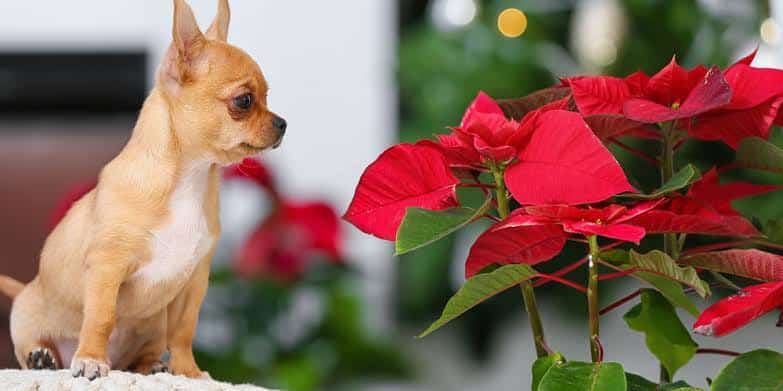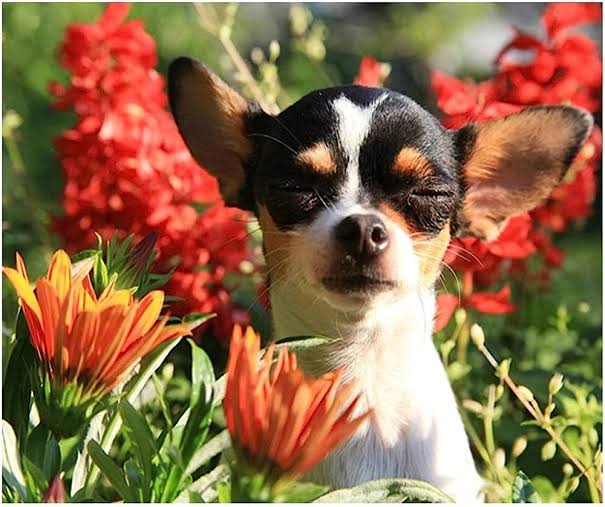Welcome readers! In our quest to create pet-friendly homes, it’s crucial to address the question “Are Poinsettias Toxic To Dogs?”. To enable a good understanding of the article, we will also discuss; Brief Overview Of Poinsettias, Concerns About Poinsettias Toxicity To Dogs, Scientific Facts About Poinsettia Toxicity In Dogs, Signs Of Poinsettia Poisoning In Dogs, etc.
We need to look into common household items that may pose a threat to our furry friends. One such concern often arises during festive seasons when vibrant poinsettias adorn our living spaces. In this article, we unravel the mystery: Are poinsettias toxic to dogs? Join us as we explore the facts and dispel myths surrounding these festive plants, ensuring your home remains safe for every member of the family.
See Also: List of Dog Safe Flowers

Brief Overview Of Poinsettias
Originating from Mexico, the poinsettia, or Euphorbia pulcherrima, gained popularity due to its vivid red bracts. Traditionally associated with Christmas, these plants symbolize purity and are believed to bring good cheer during the holiday season.
Poinsettias are available in various colors, including red, white, pink, and even bi-color variations. With numerous cultivated varieties, each boasting unique characteristics, these plants offer a spectrum of choices for festive decorations.
Concerns About Poinsettias Toxicity To Dogs
Before delving into the toxicity concerns, it’s essential to understand the components of the poinsettia plant. Poinsettias contain a milky, white sap that contains compounds known as diterpenoid euphorbol esters. While these compounds can cause mild irritation, the level of toxicity is often exaggerated in popular belief.
Contrary to widespread misconceptions, poinsettias are generally not highly toxic to dogs. In most cases, if a dog ingests parts of the plant, it might experience mild symptoms such as drooling, vomiting, or mild stomach upset. Severe reactions are rare, and fatalities are extremely uncommon.
See Also: List of Dog Toxic Flowers
Scientific Facts About Poinsettia Toxicity In Dogs
Contrary to popular belief, scientific studies indicate that poinsettias pose a relatively low level of toxicity to dogs. The compounds present in the plant can cause mild irritation if ingested, leading to symptoms such as drooling, vomiting, or mild stomach upset. Severe reactions are rare, and fatalities are extremely uncommon.
The body’s natural detoxification processes play a role in mitigating the effects of poinsettia ingestion. Encouraging dogs to drink water can aid in diluting any potential irritants, promoting the elimination of the plant’s compounds from the system. However, monitoring for severe symptoms and seeking veterinary guidance remains essential.
Scientific facts regarding poinsettia toxicity to dogs reveal a lower level of risk than commonly believed. Understanding the composition of poinsettias and the body’s natural detoxification processes allows pet owners to care for their dogs properly.
See Also: Brown and White Dog Breeds

Signs Of Poinsettia Poisoning In Dogs
Poinsettias, with their vibrant red and green foliage, are a common sight during the holiday season. While they add festive charm to our homes, it’s crucial for pet owners to be aware of the potential toxicity these plants pose to dogs. Below are the signs of poinsettia poisoning in dogs:
Gastrointestinal Distress
Dogs that have ingested poinsettia leaves may exhibit symptoms such as vomiting, drooling, and diarrhea. It’s crucial to monitor your pet’s behavior and seek veterinary attention if these signs persist.
Oral Irritation
The sap from poinsettias can cause irritation in a dog’s mouth, leading to excessive licking or pawing at the face. Pay close attention to any changes in your dog’s behavior, especially if they seem uncomfortable.
Loss Of Appetite
Poinsettia poisoning can result in a loss of appetite in dogs. If your furry friend suddenly loses interest in food, it could be an indication of ingestion of toxic plant material.
Lethargy
A dog affected by poinsettia toxicity may become lethargic or unusually tired. This change in energy levels could be a red flag that something is amiss.
See Also: Are Lilies Toxic to Dogs?: Find out How it Affects Them

Preventing Poinsettia Poisoning In Dogs
Awareness Of Poinsettia Toxicity
Understanding that poinsettias contain a mildly toxic substance is the first step in prevention. While the toxicity level is generally low, taking precautions becomes crucial, especially for inquisitive dogs who may be tempted to explore these vibrant plants.
Choosing Pet-Safe Alternatives
Opting for pet-friendly holiday decorations is a proactive way to eliminate the risk of poinsettia poisoning. Explore artificial plants or non-toxic alternatives to bring festive cheer into your home without compromising your dog’s safety.
Elevated Placement Of Poinsettias
Strategically placing poinsettias out of your dog’s reach is an effective preventive measure. Consider placing them on high shelves, tables, or using hanging planters to ensure your pup cannot access the leaves, reducing the risk of accidental ingestion.
Training And Behavior Management
Invest time in training your dog to avoid plants and other potentially hazardous items. Reinforce positive behaviors and discourage exploration of unfamiliar objects. This proactive approach can significantly reduce the likelihood of poinsettia ingestion.
Veterinary Guidance And Emergency Preparedness
Establishing a relationship with your veterinarian is essential for pet owners. Be aware of emergency contact information and protocols in case of suspected poisoning. Prompt communication with your vet can make a significant difference in the event of an emergency.
See Also: Are Snake Plants Toxic to Dogs? All You Need to Know

Safe Alternatives To Poinsettias For Dogs
Below, we’ll explore safe alternatives to poinsettias, ensuring a pet-friendly environment during celebrations.
- Christmas Cactus (Schlumbergera):
- Description: Christmas cacti offer a splash of color without the toxicity associated with poinsettias.
- Safety: Non-toxic to dogs and cats, making them a safe choice for pet-friendly homes.
- Care Tips: Thrives in indirect light, moderate watering, and well-draining soil.
- Spider Plant (Chlorophytum comosum):
- Description: Known for its arching green and white striped leaves, the spider plant is a popular choice for households with pets.
- Safety: Non-toxic and safe for dogs, even if they decide to nibble on the leaves.
- Care Tips: Prefers bright, indirect light and requires well-draining soil.
- African Violet (Saintpaulia):
- Description: These dainty, flowering plants add a touch of elegance to any space.
- Safety: Non-toxic to dogs and cats, making them a pet-friendly choice for indoor gardens.
- Care Tips: Keep soil consistently moist, and provide bright, indirect light.
- Areca Palm (Dypsis lutescens):
- Description: With its feathery fronds, the Areca Palm is a decorative and non-toxic option.
- Safety: Safe for dogs and cats, adding a tropical touch without the worry of toxicity.
- Care Tips: Thrives in bright, indirect light and well-draining soil; allow the top inch of soil to dry before watering.
- Bromeliads (Bromeliaceae family):
- Description: Colorful and unique, bromeliads come in various species, all non-toxic to pets.
- Safety: Safe for dogs and cats, making them an excellent choice for pet-friendly homes.
- Care Tips: Provide bright, indirect light and keep the central cup filled with
See Also: Best Dog Food for Skin Allergies
Frequently Asked Questions
Are Poinsettias Toxic To Dogs?
Yes, poinsettias are considered mildly toxic to dogs. Ingesting the leaves or stems can cause mild gastrointestinal discomfort, such as vomiting or drooling.
What Are The Signs Of Poinsettia Poisoning In Dogs?
Signs may include vomiting, drooling, mild upset stomach, or, in rare cases, skin irritation if they come into contact with the sap. Seek veterinary attention if severe symptoms persist.
How Much Poinsettia Does It Take To Harm A Dog?
The toxicity of poinsettias is relatively low. However, it’s essential to monitor your dog and seek veterinary advice if they’ve ingested any part of the plant.
How Can I Keep My Dog Safe During The Holidays With Poinsettias Around?
Place poinsettias out of reach, consider using pet-safe alternatives, and monitor your dog’s behavior. If you suspect ingestion, contact your vet immediately.
What Are Safe Alternatives To Poinsettias For Dog-Friendly Decorations?
Consider alternatives like Christmas cacti, spider plants, African violets, Areca palms, or bromeliads, which are non-toxic to dogs and provide a festive atmosphere.
Conclusion
While Poinsettias are often considered mildly toxic to dogs, the risk of serious harm is minimal. It’s crucial to prioritize pet safety by keeping these festive plants out of their reach. Opt for pet-friendly alternatives during the holiday season, ensuring a joyful and secure environment for both your furry friends and your festive celebrations. Always consult with a veterinarian if you suspect any ingestion, and remember, a little extra caution goes a long way in safeguarding your beloved pets.

